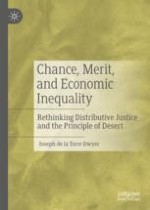2020 | OriginalPaper | Buchkapitel
7. Economy and Desert
verfasst von : Joseph de la Torre Dwyer
Erschienen in: Chance, Merit, and Economic Inequality
Aktivieren Sie unsere intelligente Suche, um passende Fachinhalte oder Patente zu finden.
Wählen Sie Textabschnitte aus um mit Künstlicher Intelligenz passenden Patente zu finden. powered by
Markieren Sie Textabschnitte, um KI-gestützt weitere passende Inhalte zu finden. powered by
